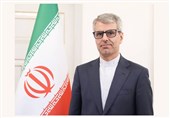Iran Reiterates Sovereignty over 3 Persian Gulf Islands
TEHRAN (Tasnim) – Iranian foreign ministry once again emphasized Tehran’s full sovereignty over three islands in the Persian Gulf, over which the United Arab Emirates (UAE) has made baseless claims, saying the trio are an integral part of Iranian territory.
“The three Iranian islands do and will belong to the Islamic Republic of Iran and Iran’s historical possession of the islands is an undeniable truth,” Iranian Foreign Ministry Spokeswoman Marziyeh Afkham said on Friday.
She made the remarks in response to the comment, made earlier by the UAE Foreign Minister Shaikh Abdullah bin Zayed Al Nahyan.
In a joint press conference withGermany's outgoing Foreign Minister Guido Westerwelle on Wednesday, the Emirati minister had repeated the unsubstantiated claim on the Iranian islands of the Greater Tunb, the Lesser Tunb, and Abu Musa in the Persian Gulf.
“We have a hanging issue with Iran - Iran still occupies after 42 years three of our islands,” Al Nahyan said.
Rejecting the Arab state’s claims, Afkham added, “Any comment that disregards the existing realities in the Middle East region and the Persian Gulf would not contribute to the regional convergence and revival of relations among regional countries.”
The islands have historically been part of Iran, proof of which can be found and corroborated by countless historical, legal, and geographical documents in Iran and other parts of the world. However, the United Arab Emirates has repeatedly laid claim to the islands.
The islands fell under British control in 1921 but on November 30, 1971, a day after British forces left the region and just two days before the UAE was to become an official federation, Iran's sovereignty over the islands was restored.
Iran recognizes that Arabs ruled the islands for centuries, but all historical documents show that they did so from the Iranian port city of Lengheh and therefore as Iranian subjects.
Together, Abu Musa, Greater Tunbs and Lesser Tunbs amount to fewer than 26 square kilometers of sand and scrub. But their location in the middle of Persian Gulf shipping and tanker lanes near the Strait of Hormuz gives the islands huge strategic importance.
The Strait of Hormuz is the world's most important oil chokepoint. The US Energy Information Administration, a statistical and analytical agency within the US Department of Energy, says 17 million barrels of oil pass through the Strait every day, which is nearly 20 percent of all oil traded worldwide, or 40 percent of seaborne oil.






